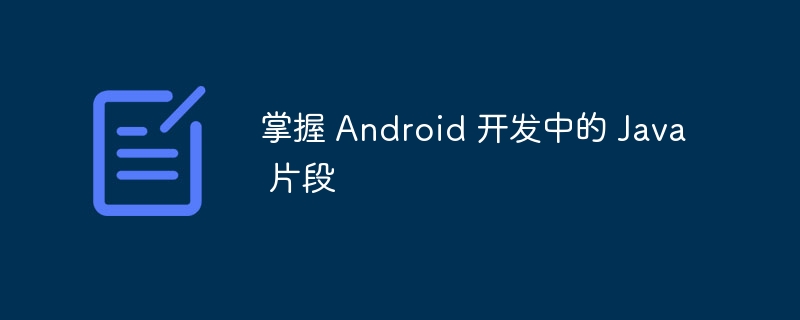
fragments 是 android 开发中的关键组件,为创建动态用户界面提供了模块化且可重用的架构。片段代表活动中用户界面的一部分,允许更灵活和可管理的 ui 设计,尤其是在较大的屏幕上。本文将指导您了解 java 中片段的基础知识、它们的生命周期以及如何在 android 项目中实现它们。
fragment 的生命周期与其宿主 activity 的生命周期密切相关,但还具有其他状态。以下是关键阶段:
第一步:创建片段类
要创建片段,请扩展 fragment 类并重写必要的生命周期方法。
public class myfragment extends fragment {
@nullable
@override
public view oncreateview(@nonnull layoutinflater inflater, @nullable viewgroup container, @nullable bundle savedinstancestate) {
// inflate the layout for this fragment
return inflater.inflate(r.layout.fragment_my, container, false);
}
}
第 2 步:定义片段布局
立即学习“Java免费学习笔记(深入)”;

媒体包提供了可管理各种媒体类型的类。这些类可提供用于执行音频和视频操作。除了基本操作之外,还可提供铃声管理、脸部识别以及音频路由控制。本文说明了音频和视频操作。 本文旨在针对希望简单了解Android编程的初学者而设计。本文将指导你逐步开发使用媒体(音频和视频)的应用程序。本文假定你已安装了可开发应用程序的Android和必要的工具,同时还假定你已熟悉Java或掌握面向对象的编程概念。感兴趣的朋友可以过来看看
 0
0

在 res/layout 目录中为片段创建 xml 布局文件(例如,fragment_my.xml)。
<?xml version="1.0" encoding="utf-8"?>
<linearlayout xmlns:android="http://schemas.android.com/apk/res/android"
android:layout_width="match_parent"
android:layout_height="match_parent"
android:orientation="vertical"
android:padding="16dp">
<textview
android:id="@+id/textview"
android:layout_width="wrap_content"
android:layout_height="wrap_content"
android:text="hello, fragment!"
android:textsize="18sp"/>
</linearlayout>
第 3 步:将片段添加到 activity
在 activity 的布局 xml 文件中,使用 fragmentcontainerview 来定义片段的放置位置。
<androidx.fragment.app.fragmentcontainerview
android:id="@+id/fragment_container"
android:layout_width="match_parent"
android:layout_height="match_parent"/>
第四步:在activity中显示fragment
在您的 activity 中,使用 fragmentmanager 添加或替换 fragmentcontainerview 中的片段。
public class MainActivity extends AppCompatActivity {
@Override
protected void onCreate(Bundle savedInstanceState) {
super.onCreate(savedInstanceState);
setContentView(R.layout.activity_main);
if (savedInstanceState == null) {
getSupportFragmentManager().beginTransaction()
.replace(R.id.fragment_container, new MyFragment())
.commit();
}
}
}
以上就是掌握 Android 开发中的 Java 片段的详细内容,更多请关注php中文网其它相关文章!

每个人都需要一台速度更快、更稳定的 PC。随着时间的推移,垃圾文件、旧注册表数据和不必要的后台进程会占用资源并降低性能。幸运的是,许多工具可以让 Windows 保持平稳运行。

Copyright 2014-2025 https://www.php.cn/ All Rights Reserved | php.cn | 湘ICP备2023035733号